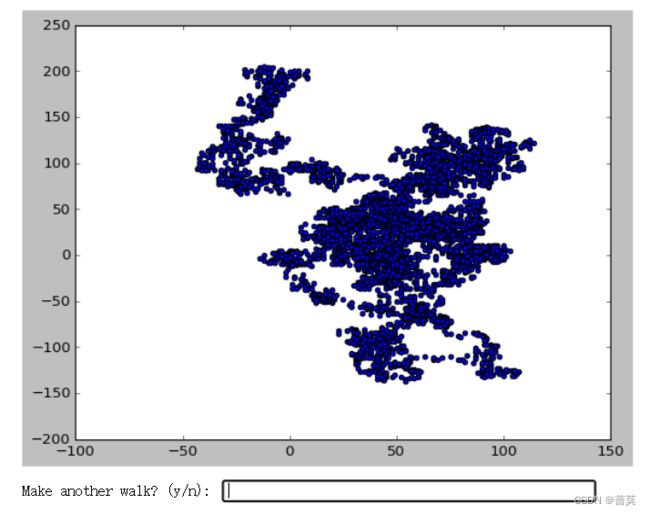python-随机漫步
创建RandomWalk 类
随机地选择前进方向
from random import choice
class RandomWalk():
# 一个生成随机漫步数据的类
def __init__(self, num_points=5000):
# 初始化随机漫步的属性
self.num_points = num_points
#所有随机漫步都始于(0, 0)
self.x_values = [0]
self.y_values = [0]
choice()函数:从一个序列中随机选择一个元素并返回
随机漫步包含的默认点数设置为5000
选择方向
def fill_walk(self):
# 计算随机漫步包含的所有点
# 不断漫步,直到列表达到指定的长度
while len(self.x_values) < self.num_points:
# 决定前进方向以及沿这个方向前进的距离
x_direction = choice([1, -1])
x_distance = choice([0, 1, 2, 4])
x_step = x_direction * x_distance
y_direction = choice([1, -1])
y_distance = choice([0, 1, 2, 4])
y_step = y_direction * y_distance
# 拒绝原地踏步
if x_step == 0 and y_step == 0:
continue
# 计算下一个点的X和Y值
next_x = self.x_values[-1] + x_step
next_y = self.y_values[-1] + y_step
self.x_values.append(next_x)
self.y_values.append(next_y)
方法fill_walk() 来生成漫步包含的点并决定每次漫步的方向
绘制随机漫步图
import matplotlib.pyplot as plt
# 创建一个RandomWalk实例
rw = RandomWalk()
rw.fill_walk()
# 将所有的点都绘制出来
plt.style.use('classic')
fig, ax = plt.subplots()
ax.scatter(rw.x_values, rw.y_values, s=15)
plt.show()
模拟多次随机漫步
while True:
# 创建一个RandomWalk实例。
rw = RandomWalk()
rw.fill_walk()
# 将所有的点都绘制出来。
plt.style.use('classic')
fig, ax = plt.subplots()
ax.scatter(rw.x_values, rw.y_values, s=15)
plt.show()
keep_running = input("Make another walk? (y/n): ")
if keep_running == 'n':
break
设置随机漫步图的样式
给点着色
point_numbers = range(rw.num_points)
ax.scatter(rw.x_values, rw.y_values, s=15, c=point_numbers,cmap=plt.cm.Blues, edgecolors='none')
edgecolors='none':删除每个点周围的轮廓
最终的随机漫步图从浅蓝色渐变为深蓝色
重新绘制起点和终点
# 突出起点和终点
ax.scatter(0, 0, c='green', edgecolors='none', s=100)
ax.scatter(rw.x_values[-1], rw.y_values[-1], c='red', edgecolors='none',s=100)
隐藏坐标轴
ax.get_xaxis().set_visible(False)
ax.get_yaxis().set_visible(False)
增加点数
rw = RandomWalk(50_000)
调整尺寸以适合屏幕
fig, ax = plt.subplots(figsize=(15, 9))
创建图表时,可传递参数figsize(元组) 以指定生成的图形的尺寸
单位为英寸
1英寸=2.54 厘米
分辨率:100像素/英寸
dpi:图像每英寸长度内的像素点数
fig, ax = plt.subplots(figsize=(15, 9),dpi=128)
完整代码展示
from random import choice
class RandomWalk():
# 一个生成随机漫步数据的类
def __init__(self, num_points=5000):
# 初始化随机漫步的属性
self.num_points = num_points
# 所有随机漫步都始于(0, 0)
self.x_values = [0]
self.y_values = [0]
def fill_walk(self):
# 计算随机漫步包含的所有点
# 不断漫步,直到列表达到指定的长度
while len(self.x_values) < self.num_points:
# 决定前进方向以及沿这个方向前进的距离
x_direction = choice([1, -1])
x_distance = choice([0, 1, 2, 4])
x_step = x_direction * x_distance
y_direction = choice([1, -1])
y_distance = choice([0, 1, 2, 4])
y_step = y_direction * y_distance
# 拒绝原地踏步
if x_step == 0 and y_step == 0:
continue
# 计算下一个点的X和Y值
next_x = self.x_values[-1] + x_step
next_y = self.y_values[-1] + y_step
self.x_values.append(next_x)
self.y_values.append(next_y)
import matplotlib.pyplot as plt
while True:
# 创建一个RandomWalk实例。
rw = RandomWalk(50_000)
rw.fill_walk()
# 将所有的点都绘制出来
plt.style.use('classic')
fig, ax = plt.subplots(figsize=(15, 9), dpi=128)
point_numbers = range(rw.num_points)
ax.scatter(rw.x_values, rw.y_values, s=15, c=point_numbers,
cmap=plt.cm.Blues, edgecolors='none')
# 突出起点和终点
ax.scatter(0, 0, c='green', edgecolors='none', s=100)
ax.scatter(rw.x_values[-1], rw.y_values[-1],
c='red', edgecolors='none', s=100)
# 隐藏坐标轴。
ax.get_xaxis().set_visible(False)
ax.get_yaxis().set_visible(False)
plt.show()
keep_running = input("Make another walk? (y/n): ")
if keep_running == 'n':
break


